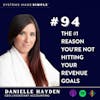The #1 Reason You're Not Hitting Your Revenue Goals w/ Danielle Hayden

It’s easy to get overwhelmed by everything you need to know to grow a business, but ignoring your numbers is not a strategy. If you’re ready to develop the business systems and processes, along with the confidence you need to create sustainable profits and hit your goals, this is for you!
Truth time: As you work to grow a business, are you afraid of looking at the numbers and diving into the financial side of entrepreneurship?
Are you ready to finally demystify those numbers so you can implement the right business systems and processes, AND gain the confidence you need to create sustainable profits?
Are you ready to not just account for your expenses and team pay, but ALSO to start paying yourself a REAL income?
BY THE TIME YOU FINISH LISTENING TO MY INTERVIEW WITH DANIELLE HAYDEN, YOU’LL LEARN:
- Why ignoring your numbers is not a strategy if you want to grow a business and hit your goals
- How to determine your annual financial goals (and how you can start paying yourself!)
- Hiring an accountant
- The #1 monthly report you should be running as a part of your business systems and processes
- PLUS, the best software to use when tracking your finances
_____________
Liked this episode? Pay it forward and share it with a friend.
Love the show? Write a 5-star review — even one sentence helps us keep bringing you the content you want to hear.
More from Courtney:
- Website: theeffortlesslife.co
- Instagram: @thecourtneyelmer
Some product links on this site are affiliate links, which means we'll earn a small commission for any affiliate purchases you make (at no additional cost to you). We only recommend products that we use and/or personally trust, so you can browse with confidence.
All Rights Reserved | © The EffortLESS Life®
00:00.72 Courtney Elmer
Danielle, welcome to the AntiFragile Entrepreneurship™ podcast. I have been looking forward to the conversation on how to grow a business and hiring an accountant since you reached out about being on the show. What we have to talk about today is something that most entrepreneurs don't like talking about, but it is so important when it comes to Hiring an accountant, isn’t it?
00:25.21 Danielle Hayden
Thank you so much for having me! And yeah, this is a conversation that is difficult for entrepreneurs because they don’t know how to grow a business or the tips to hiring an accountant. We are trained not to talk about money and finances growing up. It's something that should be kept private and maybe even shameful. We all have a lot of stories about money. So my goal every time I talk on a podcast or I talk to a client is to take the overwhelm out of accounting, out of numbers, out of finance, because it needs to be something that you address so you can all be successful.
01:15.29 Courtney Elmer
It's funny you mention money stories or Hiring an accountant. Speaking personally here for a moment, I've done a lot of work on my own money stories. I grew up in a family where my dad is a financial planner — has been for gosh, fifty years now. But growing up, money and Hiring an accountant tended to be a sore topic in our family. I always felt pressured when it came to money. In my adult life, I had to unlearn a lot of things and relearn how to approach money, particularly the numbers in my business.
One of the pillars we teach our students inside our Visionary Leader Incubator™ about getting operational systems in place, and right before we hit record we were laughing at what I call this behind the scenes — it’s like the junk drawer. It’s the stuff nobody wants to deal with. Everyone loves the shiny marketing and sales. We all know we need money to make our business run. But on the back end, the bookkeeping, accounting, hiring an accountant, legal stuff, HR, etc. gets put into the “junk drawer.”
02:46.50 Danielle Hayden
And it's the most important place right? We need the items in the junk drawer! These are the backbone of our business and they have to be something that we're actually keeping front and center. Every month, every week, every day. That is how we're going to succeed as entrepreneurs. We have to open that drawer, and we have to keep it open.
03:11.71 Courtney Elmer
Yes, I couldn't have said that better about how to grow a biz and hiring an accountant. So that's the conversation today: we are opening the drunk drawer and we are looking at the numbers so you can learn how to grow a business. Danielle, based on your background coming from corporate and moving into the entrepreneurial spacem what’s the first thing you do when you start working with a client in getting them clear on the numbers in their biz or hiring an accountant?
03:37.20 Danielle Hayden
You have to start at the beginning with the fundamentals when it comes to learning how to grow a business. Most of the entrepreneurs who come to us are unorganized and feel shame for it. They're confused. There's so much information online. They don't know who to trust and they don't know where to begin. I always tell people first and foremost you have to separate your business and your personal finances. This is business 101 when it comes to hiring an accountant.
If you have not done that yet, and you are taking money from any client, you have to separate your business and your personal finances. I want to see it done that way. Your accountant wants to see it done that way because it allows for easier bookkeeping. Otherwise you can have some issues with the IRS down the line. Your family wants it done this way because they want to see how the venture is performing. That’s first. Then we can talk about all the fancy tracking and systems and analysis. But we have to have that separated so that we can keep good records.
04:55.95 Courtney Elmer
Yeah, such a great point about how to grow a business. Separating your finances helps you be more organized when it comes to your numbers because suddenly, everything is clean and separate, it’s no longer mashed together. And it’s easier to get a snapshot of how the venture is performing.
05:16.69 Danielle Hayden
If you're spending from the same credit card in the same debit card for personal finances as you are for startup, you're always going to be operating from a place of scarcity. That’s the biggest surprise I had moving from corporate to the world of entrepreneurship. When I used to hear the term “mindset,” I thought, “What a bunch of hoopla. Numbers are black and white! Then I started working with more entrepreneurs and I realized, we all have a mindset, right? It’s one thing we have to fine tune, just like our strategies, is our mental approach. Some of us have to learn how to operate from a place of abundance instead of scarcity.
So by separating your finances, you're creating the systems to allow for your mindset to operate from that place of abundance and grow a business.
06:37.82 Courtney Elmer
So what would you say to someone who’s listening and they're nodding because they’ve heard this before, but maybe they haven’t implemented it yet so they can grow a business. What else do they need to to notice or to be aware of in order to start operating from this place of abundance?
07:04.89 Danielle Hayden
You need to start tracking so you can grow a business and have no issues hiring an accountant. Once you have everything separated, you need to start tracking. I prefer for every entrepreneur to have an accounting system. There are plenty of systems these days. But choose a system in which you’re going to track all of your income and all of your expenses. You can do that on your own, hire a bookkeeper, or have a VA help you, but bottom line you need to have the system in place. It does nothing for you if you open the account and never update it. Bookkeeping doesn't get done on its own, so you have to first set up the system and then keep the system updated.
08:02.56 Danielle Hayden
Then you have the foundation laid out to be able to see where you’re making money and where you’re spending money. But it doesn't stop there. Your job as a CEO is not to process the transactions, or to do the bookkeeping, but as a CEO, your job is to look at the numbers and read the story that your numbers are trying to tell you. Identify what's working in your business, what's not working in your business ,where you can double down, what you can stop doing and capitalize on those numbers and that analysis to then plan for the future and reach your goals so you can grow a business.
08:56.77 Courtney Elmer
Yeah, something that I have found in my own business having those hard and fast numbers is that when you look at the numbers, they’re never as bad as you think they are or it's never as bad as you're making them out to be in your mind and when you have that information it empowers you because then you can make empowered decisions about the future of your business.
09:20.00 Danielle Hayden
That is so true. I've been calling this the Report Card Syndrome. When you get a report card as a kid, it tells you how well you did. It tells you if you're passing, or if you’re failing. So when we get our financials as entrepreneurs, right out the gate we look at it like am I passing, oor am I failing. We had a client who came to us and she said to me, Danielle I don't have a lot of cash in my bank account. I'm struggling this year, and I need you to teach me how to run this business at a loss until I can turn things around. So I said okay, we'll take care of you. We did a catch up, which is when we take all the transactions year to date and bring them into the accounting system.
Then we sat down to review the financial year to date and I said, Honey, you do not have a loss. You have a profit, and because it's October, we only have two months to make business decisions to reduce your profit and start saving for taxes. The problem was that she didn't understand that she was taking owners draws and commingling business and personal.
10:49.28 Danielle Hayden
So every time she swiped that card personally, yes, it was cash from her business every time she took an owner's draw. Yes, it was cash from her business--this is not how to grow a business. But when you actually put together the numbers there was a profit and she needed to do something about it.
What’s interesting about this story is that she had a 100% mindset shift. She came from a place of scarcity, but she was brave enough to look at the numbers and was willing to ask for help. We saw that she was profitable and her entire mindset shifted. She went into the next year making double down investments in her business and growing. Had she not looked at the numbers, I don't think she'd be here today.
12:00.72 Courtney Elmer
You hit the nail on the head there with the bravery and the courage to face the numbers — they are so easy to avoid and will impact your ability to grow a business. This next question may be basic, but chances are some people listening are probably thinking this (and it's okay if you are because I was at this point in my business too) what are the numbers specifically that we should be looking at without fail as CEO of our business?
12:35.40 Danielle Hayden
Yes, good question about how to grow a business and tips for hiring an accountant. So there's a lot of talk about gross revenue right? So how often do you hear, you have 6 figures this, 6 figures that. I don't care about your gross income. I mean, it's important. It should match the point of sale system. But I want to hear about your profit margin. This is your revenue. Revenue is all the money that you've billed your customers, minus direct labor or direct cost for any products.
I can't tell you how often people will tell me I brought in all this revenue, but they have no idea how much they took home or profited. So I want you to be looking at sales minus direct labor and direct cost of goods sold. Does that number make sense when it comes to grow a business?
13:48.78 Courtney Elmer
Let’s clarify this a little bit more for those that don't have a product based business. Say they have a service based business or they’re a course creator or a coach and they’re billing for their time. Would that mean they're not looking at the cost of goods sold, but also other expenses and who they are directly paying, be it contractor or employee?
14:15.69 Danielle Hayden
Yeah, good question about how to grow a business. So if they have somebody servicing that client, for example, that client cannot get the services unless that contractor or employee works here, that would be “cost of goods sold” because you can't service that client without that team member. Also I’m going to burst the bubble here: as the business owner, your time is not free.
14:53.99 Danielle Hayden
So if you are a coach and you are servicing your clients, I want you to understand whether or not you are profitable after you pay yourself for that time. Why? Because you are going to run out of time and you're either going to have to hire more employees, or you're going to have to move into a group model or raise your prices. Otherwise you can't make any more money. So taking your own time into account is so critical. Does that make sense when it comes to how to grow a business?
15:20.99 Courtney Elmer
One hundred percent. It’s so, so important, so listen closely: to echo Danielle, you are not free. Your time is worth something. As entrepreneurs, we make the mistake oftentimes dismissing that and saying well I'll do XYZ myself so I don't have to pay someone else to do it. No, you still are paying for that with your time, which has a value. In fact in a prior episode — episode 48 I think, if memory serves me — we talked about how to put a value on your hourly rate. And how to sell your value, not your rate. Because you are not free and your time is worth money and this directly impacts the bottom line in your venture and how you grow a business.
18:42.82 Danielle Hayden
Yeah, absolutely. and circling back to what you originally asked about what other numbers we need to look at, another category is your operating expenses. This might be a co-working space. This might be Zoom, or all of the marketing subscriptions that you need, your attorney, your bookkeeper, your VA, any contractors who you have are who are supporting you. These are all what we call operating expenses. We have clients who say to us all the time, Wow I had no idea how much I was spending on subscriptions, or Wow I spent a lot of money on advertising this year.
There’s a simple report you can run in QuickBooks called a “Percent of Sales” report. What it tells you is that you've spent x percent of your revenue on advertising consultants, or you spent fifteen percent of your total revenue on operations subscriptions, or you've spent twenty percent of your revenue on your contractors or employees. And what this does is you can go down the line and see: where am I spending most of my money?
Once you have that you can compare those numbers to your goals. If I was in a season where I was hiring and I said, I want to bring on contractors, maybe your payroll goes up but if your goal was to have more freedom and time and energy in your personal life, then that means you might not be as profitable this year but you will have met your goal. And you can also tighten up areas where you’re spending more than you want to and reallocate that money elsewhere to grow a business.
22:02.20 Courtney Elmer
This leads right into the next question I wanted to ask you which is, when it comes to your annual financial goals, what's the first step in determining those so you can grow a business? You may say it varies from business to business, because it's going to depend uniquely on where you are in your business right now. But if we were to kind of give a thirty thousand foot look at that, how would you determine those annual financial goals?
22:47.76 Danielle Hayden
I love budgeting and planning sessions because it gives you the roadmap that you need in your business. It gives you guidance. It gives you boundaries for spending and it allows for spending. The first part of doing that budget or planning session is to actually take a step back and plan time where you're going to work on your business and not in your business. This isn't something you do in between client meetings.
This is the time that you've put on the calendar where you say, I'm going to take a step back and reflect on my business — what's working, and what's not working. What is my goal for next year? Maybe it’s to grow top-line revenue. To do that, you need momentum so you can grow a business. So this year, I’m going to invest in marketing consultants and paid advertising, for example. Or you might say this is the year I need to take home a paycheck, which means I need to focus on profitability and plan to get myself in the budget.
25:27.11 Courtney Elmer
The vein I’m hearing through all of this is that knowing your numbers helps you get clear on your goal so you can reverse engineer the process to get there. You're beginning with the end in mind, looking at what the numbers are saying now, where you want to go, and how you can get the numbers to match so you can achieve our goal to grow a business and learn tips on hiring an accountant.
25:54.23 Danielle Hayden
You beautifully summarized that.
25:59.70 Courtney Elmer
And if you want to listen to the short clip of this podcast and get the nutshell version — no I'm kidding, but this is the heart of it. This is what numbers in your business helps you to do so you can grow a business. Danielle this has been such a valuable conversation, I would love to bring you back on and drill into this even more because there are layers here and we could go deeper and deeper.
26:23.54 Danielle Hayden
There's so many layers to grow a business. I'm happy to come back and break this down even further. This is an important topic. People will say to me all the time Danielle I'm sick of hearing I have to know my numbers/ I don't even know what that means. I don't know what that's going to do for me. So what we beautifully captured here is the essence of why we say to know your numbers.
26:52.61 Courtney Elmer
Yeah, and when you have that understanding of them, tracking them doesn't become so mundane. Speaking from my own experience, that was the biggest shift for me. Once I began to take a look at the numbers in my business, it got fun. Before it was always a thing that I dreaded but then it totally shifted because I saw what knowing my numbers could help me do. And because I had an understanding of the numbers and the story they were telling me, I saw that it’s not about your story about the numbers. It’s the story your numbers are telling you.
27:38.47 Danielle Hayden
This is not your story about the numbers! That's where working with somebody can help you decipher: what's your story about the numbers versus what the actual story could be. It’s about what can I shift and make different so that I can hit my goals? Let's analyze this and figure out what we did right; let's learn from the lessons of what we did wrong, and recalibrate and try again to grow a business.
29:21.67 Courtney Elmer
Since you mentioned working with someone can be so helpful, especially if you have been the person who’s avoided in numbers, for those listening right now that would like to reach out to you and learn more about what you do and how you can help entrepreneurs in the growth of their business, where do people go to find you online?
29:50.31 Danielle Hayden
Yeah, the best place is the website kickstartaccountinginc.com We hang out on Instagram @kickstartaccounting I know that this is a tough topic and so if you are thinking this feels heavy, and you're looking for a safe space to come and talk about your specific situation, head to my website and set up a call with our team, you could book a call and we could talk about your specific situation and what's going on in your business so that we can help you with the right fit for you and your business and where you're at today.
30:32.26 Courtney Elmer
Awesome, we’ll be sure to link that up. So Danielle, my final question for you is, what does it mean to you to live an EffortLESS Life®?
31:05.33 Danielle Hayden
For me nothing ever feels effortless but it feels purposeful… and because it’s purposeful, it can give the feeling of being effortless. Like showing up on this podcast, this feels effortless. I’m leading my business from my heart and my passion. I get to jump out of bed every day and be of service to entrepreneurs. SO even with all of those everyday challenges, it makes everything that I do feel effortless.
31:58.86 Courtney Elmer
I love that perspective and it gives a new dimension to this whole conversation about what it means to live an effortless life. People tell me that you can't really have an effortless life. You have to work. And I’m like ok sure to some degree, but does the work you do have to feel effortful and grow a business?
32:17.78 Courtney Elmer
What you described is that it doesn't have to feel effortful. And that’s what we mean when we say it’s possible to have an effortless life and business. So good Danielle thank you for being here today. This was awesome.
32:47.64 Danielle Hayden
Of course, of course. I was so happy to be here to discuss hiring an accountant.

Danielle Hayden
CFO, entrepreneur, business owner, and mom
Danielle Hayden is a reformed corporate CFO (chief financial officer) who is on a mission to help rule-breaking female entrepreneurs understand their numbers so they can gain the confidence needed to create sustainable profits. After spending 10+ years in the boardroom as a corporate finance officer, Danielle is now in her sweet spot as the co-owner of Kickstart Accounting, Inc. where she helps business owners with bookkeeping, financial analysis, and education and as the author of the Profit Planner book series. When Danielle isn’t crunching numbers on her clients’ behalf or crafting the next iteration of the Profit Planner, you can find her hanging with her two kids as she inspires them to lead their fullest lives or doing any, and almost every fitness-related activity ranging from Spartan races to pilates.








